|
|
|
1.
|
A) | Alternate exterior angles | C) | Alternate interior
angles | B) | Corresponding angles | D) | Vertical angles |
|
|
|
2.
|
Which statement would not prove | line
q parallel to line r ? | 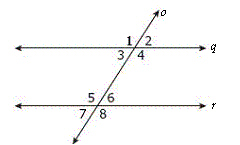 | | |
A) | Ð4 @
Ð5 | B) | Ð2 @
Ð7 | C) | Ð4 @
Ð8 | D) | Ð2 @
Ð3 |
|
|
|
3.
|
Lines x and y are cut by transversal z.
Which statement would prove
x // y? | 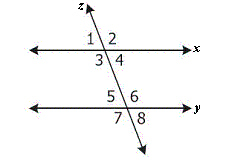 | | |
A) | mÐ3 = mÐ6 | C) | mÐ1 =
mÐ4 | B) | mÐ6 + mÐ8 =
180° | D) | mÐ4 + mÐ6 = 90° |
|
|
|
4.
|
The figure shows line s intersecting lines q and r.
In the figure, Ð1 and
Ð2 are | 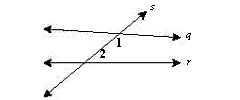 | | |
A) | consecutive interior angles | C) | corresponding
angles | B) | alternate exterior angles | D) | alternate interior angles |
|
|
|
5.
|
Which is most likely the | slope of the line graphed? | 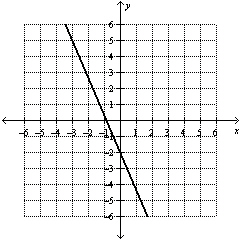 | | |
|
|
|
6.
|
Parallelogram ABCD is positioned on a
coordinate plane with the coordinates as shown.
N is the midpoint of  . .
What are the coordinates of N? | 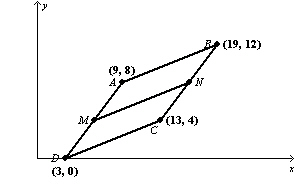 | | |
A) | (8, 16) | B) | (8, 2) | C) | (14, 10) | D) | (16,
8) |
|
|
|
7.
|
For what measure of ÐD
is  in this figure? in this figure? | 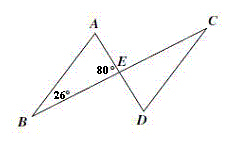 | | |
|
|
|
8.
|
Which two segments in the | drawing are most likely parallel? | 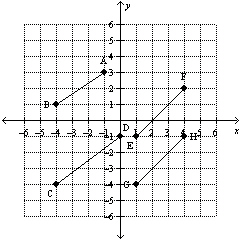 | | |
|
|
|
9.
|
A construction engineer needs to | make
sure a ceiling beam is parallel to its corresponding floor beam. Based on the drawing, which pair of
measurements is sufficient to show the beams are parallel? | 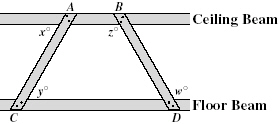 | | |
A) | x = z | B) | y = z | C) | y = w | D) | x =
y |
|
|
|
10.
|
What is the contrapositive of the following statement?
If Joe
goes fishing, then he needs bait.
A) | If Joe does not go fishing, then he does not need bait. | B) | If he needs bait,
then Joe goes fishing. | C) | If he does not need bait, then Joe does not go
fishing. | D) | If Joe goes fishing, then he does not need bait. |
|
|
|
11.
|
The measure of ÐYZV is 44 ° and the measure of ÐXYZ is 65°.
Which of these angles must measure 44° in order for  to be parallel to to be parallel to  ? ? | 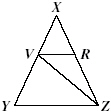 | | |
|
|
|
12.
|
In the drawing below,  and  are 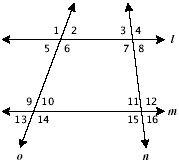 A) | alternate interior angles | D) | a linear pair | B) | consecutive interior
angles | E) | a vertical angle
pair | C) | corresponding angles | F) | alternate exterior angles |
|
|
|
13.
|
Line c is parallel to line r if
|
|
|
14.
|
Which condition will guarantee |
that line y is parallel to line z? | 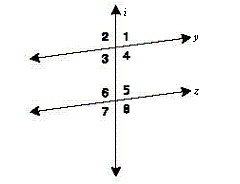 | | |
A) | Ð 3 @ Ð 8 | B) | Ð 4 @ Ð 8 | C) | Ð 8 @ Ð 5 | D) | Ð 6 @ Ð 8 |
|
|
|
15.
|
Line a passes through points with
coordinates (-4, 5) and (2, -2).
What is the slope of a line perpendicular to line a?
|
|
|
16.
|
The slope of the line joining the coordinate points (6, –4) and
(–9, 7) is
|
|
|
17.
|
In this drawing, s || t and h || j.
Which angle is not necessarily congruent to
 ? ? | 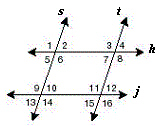 | | |
|
|
|
18.
|
Which is a valid conclusion that can be drawn from these statements?
If a quadrilateral is a rhombus, then it is a
parallelogram.
If a quadrilateral is a parallelogram, then its opposite sides are
congruent.
A) | Opposite sides of a quadrilateral are congruent. | B) | Every quadrilateral
is a rhombus. | C) | Every parallelogram is a rhombus. | D) | Opposite sides of a rhombus are
congruent. |
|
|
|
19.
|
Consider the following statements.
p: The sum of two angles is
90°.
q: The two angles are complements.
Which of the following is a symbolic
representation of the statement:
“If two angles are
not complements, then the sum of two angles is 90°”?
|
|
|
20.
|
Lines m and r are cut by a transversal.
What value of x will show that line
m is parallel to line r ? | 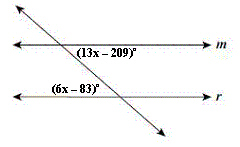 | | |
|
|
|
21.
|
Which point is the greatest distance from the origin?
A) | (–3, –4) | B) | (–2, –1) | C) | (5, –5) | D) | (–2,
3) |
|
|
|
22.
|
Line j is a transversal. For
lines k, l, m, and n, which is not parallel to the other
three?
| 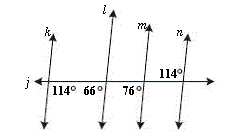 | | |
|
|
|
23.
|
Bill used a decorative fencing to
enclose his deck.
Using the information on the diagram and assuming the top and bottom
are parallel, the measure of Ðx is | 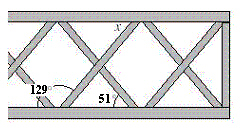 | | |
|
|
|
24.
|
A line segment has an endpoint at (–4, 1). If the midpoint of the
line segment is (0, –1), what are the coordinates of the point at the other end of the line
segment?
A) | (4, 2) | B) | (–2, 0) | C) | (–8, 3) | D) | (4,
–3) |
|
|
|
25.
|
What is the apparent slope of a
line perpendicular to  ? ? | 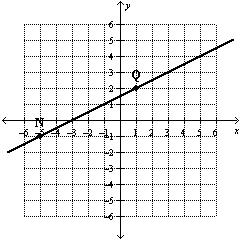 | | |
|